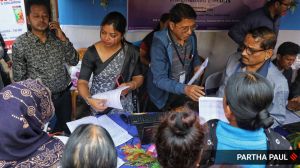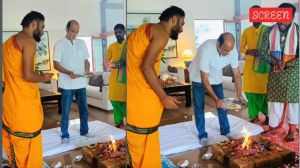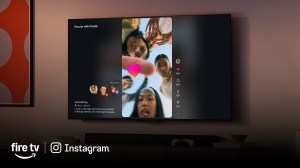Amit Trivedi: ‘We are now slaves to this demon called algorithm’
Composer Amit Trivedi on the pressure to deliver hits, the Bollywood slump that has extended to film music and why he won’t jump the multi-composer bandwagon for a film.
 Amit Trivedi
Express Photo by Amit Chakravarty 07-02-25, Mumbai
Amit Trivedi
Express Photo by Amit Chakravarty 07-02-25, MumbaiAmid multiple big-budget duds churned out by Bollywood in recent months, there was filmmaker Abhishek Kapoor’s runaway mishap — Azaad — the best bit of which was the handsome stallion it was named after. While the film launching two star kids, Rasha Thadani (Raveena Tandon’s daughter) and Aaman Devgan (Ajay Devgn’s nephew), tanked without a trace, its raunchy item number Uyi amma, with an exuberant folk theka on the dholak, paired with a shehnai and Amit Trivedi at the helm, soared on streaming platforms. “The film came and went but this song is trending,” says Trivedi, as he meets us in his studio in the middle of a chaotic and dug-up Andheri in Mumbai.
But Trivedi’s other recent project, Azaad Collab, under his own music label (AT Azaad) featuring a line-up of 22 artistes including Sunidhi Chauhan, Armaan Malik, Jubin Nautiyal and Neeti Mohan, has been a blip, despite some interesting compositions. “There has been appreciation and I had the freedom to create this one. But the numbers are not that big,” says Trivedi.
It is a telling sign when one of the most important and successful music composers of our time, who can’t easily be pinned down to any single genre and who has often thrown wildly disparate ideas together and made them belong, is concerned about numbers.
He’s the same guy who took us into the world of Patna Presleys with the cult classic Emotional atyachaar in Dev D (2008); gave us the soft and fresh strokes of Manmarziyaan in Lootera (2013), the tender Iktara in Wake Up Sid (2009), a sense of home in Aaj se teri (Pad Man, 2018), the Asha-Bhosle-meets Nina Simone vibe in the jazzed up Bombay Velvet (2015), the phenomenally drug-soaked sound in Udta Punjab (2016) and placed his tunes in the golden era of film music with Qala (2022). His anxiety, therefore, makes one thing clear: no one is exempt from the number game.
Trivedi says that in a digital world that comes with an audacious plan comprising trends, viral reels, traction and where music is a product, he is not untouched by the pressures to deliver quickly and constantly. “We are now a big slave to this demon called algorithm. Algorithms have ruined the world. I hear things like ‘since you aren’t putting out as much music, your income is dropping’. Creativity cannot function according to an algorithm. A song cannot be created like it’s a job,” says 45-year-old Trivedi, who adds that films also come with marketing budgets besides dancing actors, a story, which add the charm of the tune. “In standalone albums, you can do a few videos. But it’s not the same thing,” says Trivedi.
This conversation is laid to rest for a bit as producer-director Vipul Shah walks in the studio to check on the progress of the music for his next. Ten minutes later, when Shah leaves, we get down to discussing the pressure Trivedi faces from film producers, distributors, and even his label to churn out ‘hits’. “Halva hai kya hit?” says an exasperated Trivedi, who has considered starting his own label.
Often, he is left clamouring for time between film projects and finding his own creative outlet. “I find this pressure of delivering a hit to be quite lame. It’s easy for producers to say because their next money is coming from this. But nobody can churn out a hit. I won’t name any producers but they are really ignorant about this,” he says.
Trivedi’s experiments with sound since the past 17 years have earned him appreciation in a slew of awards including a National Award for Dev D in 2009. Then there is the appreciation from composers like AR Rahman, whose music fascinated Trivedi since he was a boy, and from those who work with him. In an earlier conversation with this writer, singer Neeti Mohan remembered that for the melancholic Dhadaam in Bombay Velvet, Trivedi shut her in a studio alone. “I was to cry my heart out. If you hear the song, my voice has cracked massively. Amit has kept it,” says Mohan.
Growing up in a Gujarati home in Bandra, music came to Trivedi through his mother, who wrote and composed devotional songs and helped with community functions by writing lyrics and directing plays. While the radio at home played Gujarati folk by artistes such as Hemant Chauhan and Damyanti Bardai, the early morning radio would often veer towards bhajans and his parents’ favourite vocalists — Hemant Kumar and Talat Mahmood. Rahman’s Roja (1992) changed things for him, making him want to not take up the typical, somewhat tedious composing styles of the time.
It was in college that Trivedi formed Om — the fusion band — with friends Shriram Iyer and Amartya Bobo Rahut. Trivedi also composed for local theatre shows in Mumbai followed by background score for television shows before a short career in advertising. “Advertising was great — short time, lot of creativity and quick results,” says Trivedi, who did jingles for McDonald’s and Airtel.
Dev D came to him when singer Shilpa Rao recommended him to Anurag Kashyap. But the film was delayed and Kashyap recommended Trivedi to Raj Kumar Gupta for Aamir (2008), which released first, turning the magical Ha Raham, the duff and banjo-heavy Sufi-esque track, into a runaway hit. The magic of Dev D, a project with lyricist Amitabh Bhattacharya, was yet to be unleashed. “It’s my first, special and still feels great,” he says.
It also cemented the synergy and a special bond between Bhattacharya and Trivedi. When the former wrote Sikko jaise, hai uchhali, manmarziyaan, Trivedi’s tune took the vagaries of life that Bhattacharya was talking about and wrote them in the sky. The effect was extraordinary. Trivedi also feels well-aligned with other lyricists like Swanand Kirkire, Varun Grover and Kausar Munir, “but Amitabh is a brother from another life.” His next projects include composing debut albums of Indian Idol winners Abhijeet Sawant and Prashant Tamang.
But being in the background with writers and directors or writing his own music is what Trivedi prefers. “I am not much of a performer,” says Trivedi. He has been touring with Azaad Collab and has even hired a choreographer and director to help him perform on stage. “I am a behind-the-scenes kind of guy. But when 10,000 people have come to listen to you, one has to do the needful,” says Trivedi.
Also Read | Zubin Mehta on leading the Symphony Orchestra of India, his love for Bombay and Trump’s comments on Gaza
He also remains ill at ease with the idea of multi-composer films — a trend these days — and prefers to work alone. “Fifty years later, if people remember Dev D’s music, and I am acknowledged as its composer, I find that important,” says Trivedi.
Does the Bollywood slump, which has also extended to the songs, concern him? “There is the problem of plenty, which is why we are going back to the old songs. Audience ko mazaa nahi aa raha hai. Music is a product and a 50-50 balance between art and commerce. The question is have we done our due diligence towards the art so as to get the 50 of the commerce part? Most of the time art is at 20. Producers don’t get that. Which is when the music flops,” says Trivedi.
- 01
- 02
- 03
- 04
- 05































